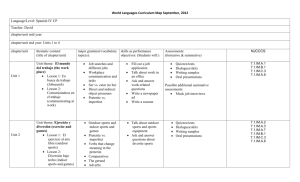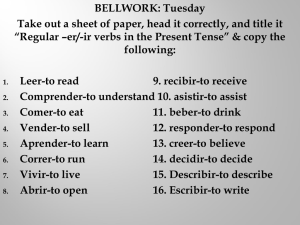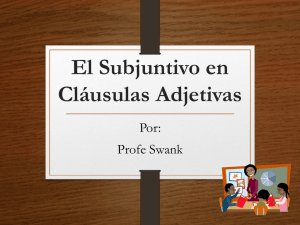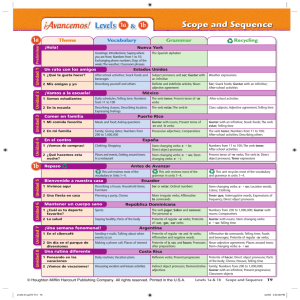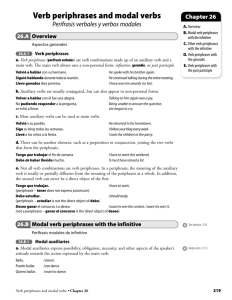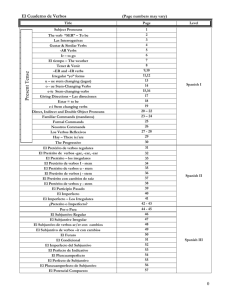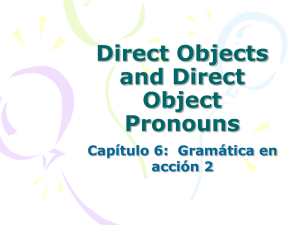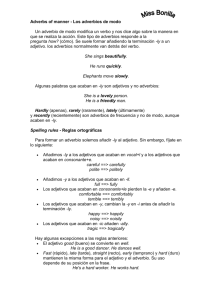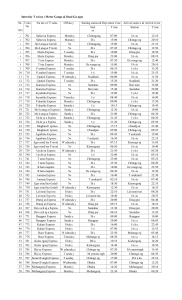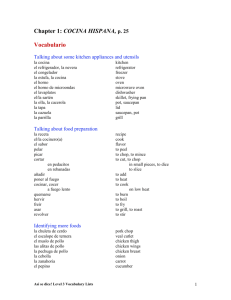1 1A 1B 2 2A 2B 3 3A 3B 4 4A 4B 5 5A 5B 6
advertisement
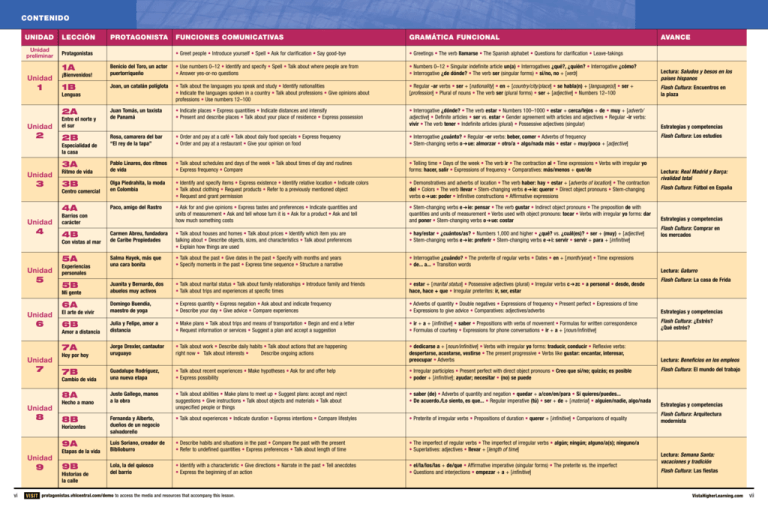
Contenido UNIDAD Lección Unidad preliminar Protagonistas Unidad 1 Unidad 2 3 Unidad 4 5 6 Unidad 7 8 Unidad 9 vi • Greetings • The verb llamarse • The Spanish alphabet • Questions for clarification • Leave-takings ¡Bienvenidos! • Numbers 0–12 • Singular indefinite article un(a) • Interrogatives ¿qué?, ¿quién? • Interrogative ¿cómo? • Interrogative ¿de dónde? • The verb ser (singular forms) • sí/no, no + [verb] 1B Joan, un catalán políglota • Talk about the languages you speak and study • Identify nationalities • Indicate the languages spoken in a country • Talk about professions • Give opinions about professions • Use numbers 12–100 • Regular -ar verbs • ser + [nationality] • en + [country/city/place] • se habla(n) + [language(s)] • ser + [profession] • Plural of nouns • The verb ser (plural forms) • ser + [adjective] • Numbers 12–100 Flash Cultura: Encuentros en la plaza 2A Juan Tomás, un taxista de Panamá • Indicate places • Express quantities • Indicate distances and intensify • Present and describe places • Talk about your place of residence • Express possession • Interrogative ¿dónde? • The verb estar • Numbers 100–1000 • estar + cerca/lejos + de • muy + [adverb/ adjective] • Definite articles • ser vs. estar • Gender agreement with articles and adjectives • Regular -ir verbs: vivir • The verb tener • Indefinite articles (plural) • Possessive adjectives (singular) Estrategias y competencias Lenguas Entre el norte y el sur 2B Rosa, camarera del bar “El rey de la tapa” • Order and pay at a café • Talk about daily food specials • Express frequency • Order and pay at a restaurant • Give your opinion on food • Interrogative ¿cuánto? • Regular -er verbs: beber, comer • Adverbs of frequency • Stem-changing verbs o ➔ ue: almorzar • otro/a • algo/nada más • estar + muy/poco + [adjective] 3A Pablo Linares, dos ritmos de vida • Talk about schedules and days of the week • Talk about times of day and routines • Express frequency • Compare • Telling time • Days of the week • The verb ir • The contraction al • Time expressions • Verbs with irregular yo forms: hacer, salir • Expressions of frequency • Comparatives: más/menos + que/de 3B Centro comercial Olga Piedrahita, la moda en Colombia • Identify and specify items • Express existence • Identify relative location • Indicate colors • Talk about clothing • Request products • Refer to a previously mentioned object • Request and grant permission • Demonstratives and adverbs of location • The verb haber: hay • estar + [adverbs of location] • The contraction del • Colors • The verb llevar • Stem-changing verbs e ➔ ie: querer • Direct object pronouns • Stem-changing verbs o ➔ ue: poder • Infinitive constructions • Affirmative expressions 4A Paco, amigo del Rastro • Ask for and give opinions • Express tastes and preferences • Indicate quantities and units of measurement • Ask and tell whose turn it is • Ask for a product • Ask and tell how much something costs • Stem-changing verbs e ➔ ie: pensar • The verb gustar • Indirect object pronouns • The preposition de with quantities and units of measurement • Verbs used with object pronouns: tocar • Verbs with irregular yo forms: dar and poner • Stem-changing verbs o ➔ ue: costar Ritmo de vida Barrios con carácter Lectura: Saludos y besos en los países hispanos Flash Cultura: Los estudios Lectura: Real Madrid y Barça: rivalidad total Flash Cultura: Fútbol en España Estrategias y competencias Flash Cultura: Comprar en los mercados 4B Carmen Abreu, fundadora de Caribe Propiedades • Talk about houses and homes • Talk about prices • Identify which item you are talking about • Describe objects, sizes, and characteristics • Talk about preferences • Explain how things are used • hay/estar • ¿cuántos/as? • Numbers 1,000 and higher • ¿qué? vs. ¿cuál(es)? • ser + (muy) + [adjective] • Stem-changing verbs e ➔ ie: preferir • Stem-changing verbs e ➔ i: servir • servir + para + [infinitive] 5A Salma Hayek, más que una cara bonita • Talk about the past • Give dates in the past • Specify with months and years • Specify moments in the past • Express time sequence • Structure a narrative • Interrogative ¿cuándo? • The preterite of regular verbs • Dates • en + [month/year] • Time expressions • de... a... • Transition words 5B Juanita y Bernardo, dos abuelos muy activos • Talk about marital status • Talk about family relationships • Introduce family and friends • Talk about trips and experiences at specific times • estar + [marital status] • Possessive adjectives (plural) • Irregular verbs c ➔ zc • a personal • desde, desde hace, hace + que • Irregular preterites: ir, ser, estar 6A Domingo Buendía, maestro de yoga • Express quantity • Express negation • Ask about and indicate frequency • Describe your day • Give advice • Compare experiences • Adverbs of quantity • Double negatives • Expressions of frequency • Present perfect • Expressions of time • Expressions to give advice • Comparatives: adjectives/adverbs Estrategias y competencias 6B Julia y Felipe, amor a distancia • Make plans • Talk about trips and means of transportation • Begin and end a letter • Request information or services • Suggest a plan and accept a suggestion • ir + a + [infinitive] • saber • .Prepositions with verbs of movement • Formulas for written correspondence • Formulas of courtesy • Expressions for phone conversations • ir + a + [noun/infinitive] Flash Cultura: ¿Estrés? ¿Qué estrés? 7A Jorge Drexler, cantautor uruguayo • Talk about work • .Describe daily habits • Talk about actions that are happening right now • . Talk about interests • Describe ongoing actions • dedicarse a + [noun/infinitive] • Verbs with irregular yo forms: traducir, conducir • Reflexive verbs: despertarse, acostarse, vestirse • The present progressive • Verbs like gustar: encantar, interesar, preocupar • Adverbs Lectura: Beneficios en los empleos Experiencias personales El arte de vivir Amor a distancia Hoy por hoy 7B Guadalupe Rodríguez, una nueva etapa • Talk about recent experiences •.Make hypotheses • Ask for and offer help • Express possibility • Irregular participles • .Present perfect with direct object pronouns • Creo que sí/no; quizás; es posible • poder + [infinitive]; ayudar; necesitar • (no) se puede 8A Justo Gallego, manos a la obra • Talk about abilities • Make plans to meet up • Suggest plans: accept and reject suggestions • Give instructions • Talk about objects and materials • Talk about unspecified people or things • saber (de) •.Adverbs of quantity and negation • quedar + a/con/en/para • Si quieres/puedes... • De acuerdo./Lo siento, es que... • Regular imperative (tú) • ser + de + [material] • alguien/nadie, algo/nada 8B • Talk about experiences • .Indicate duration • Express intentions • Compare lifestyles • Preterite of irregular verbs • .Prepositions of duration • querer + [infinitive] • Comparisons of equality Horizontes Fernanda y Alberto, dueños de un negocio salvadoreño 9A Luis Soriano, creador de Biblioburro •.Describe habits and situations in the past • Compare the past with the present • Refer to undefined quantities • Express preferences • Talk about length of time • The imperfect of regular verbs • The imperfect of irregular verbs • algún; ningún; alguno/a(s); ninguno/a • Superlatives: adjectives • .llevar + [length of time] Lola, la del quiosco del barrio • Identify with a characteristic •.Give directions • Narrate in the past •Tell anecdotes • Express the beginning of an action • el/la/los/las + de/que • .Affirmative imperative (singular forms) • The preterite vs. the imperfect • Questions and interjections •.empezar + a + [infinitive] Cambio de vida Unidad • Greet people • Introduce yourself • Spell • Ask for clarification • Say good-bye Avance • Use numbers 0–12 • Identify and specify • Spell • Talk about where people are from • Answer yes-or-no questions Mi gente Unidad Gramática funcional Benicio del Toro, un actor puertorriqueño Con vistas al mar Unidad Funciones comunicativas 1A Especialidad de la casa Unidad Protagonista Hecho a mano Etapas de la vida 9B Historias de la calle VISIT protagonistas.vhlcentral.com/demo to access the media and resources that accompany this lesson. Lectura: Gaturro Flash Cultura: La casa de Frida Flash Cultura: El mundo del trabajo Estrategias y competencias Flash Cultura: Arquitectura modernista Lectura: Semana Santa: vacaciones y tradición Flash Cultura: Las fiestas VistaHigherLearning.com vii Contenido UNIDAD Unidad 10 Lección Protagonista Funciones comunicativas Gramática funcional Avance 10A Carlos Salazar, médico de familia en La Habana • Talk about weather • Express pain and symptoms • Ask for advice • Give advice • Express obligation • hace; llueve; nieva; está nublado • doler; encontrarse + bien/mal; tener + [noun]; estar + [adjective] •.¿Qué puedo/debería hacer?; ¿Qué me aconseja(s)? • The imperative with pronouns • deberías + [infinitive] • hay que + [infinitive] Estrategias y competencias Al mal tiempo buena cara 10B Jorge Edwards, recuerdos de un escritor • Talk about memories •.Express temporal relationships in the past • Ask for and give opinions • .Express agreement and disagreement • Express what you remember • Preterite, imperfect, and present perfect • antes/después de + [infinitive/noun] • creer/opinar + que; para mí/en mi opinión • (no) estar de acuerdo; (no) tener razón; (no) ser verdad; también, tampoco • recordar, acordarse de 11A José Carlos, encantado de ayudarlo • Give recommendations • .Communicate other people’s words • Express objection • Express satisfaction • .Welcome someone and wish them well • Affirmative imperative: irregular formal forms • recomendar + [infinitive/noun] • Reported speech • decir • .estar/parecer + bien/mal • estar contento/a, encantado/a • alegrarse de • ¡qué + [adjective/adverb]! • bienvenido/a(s) • desear with object pronouns 11B Iniciativas Héctor y Gabriela, propietarios de Patagonia Natural • Present a counterargument • Talk about changes • Express the highest degree • Express wishes • Add information • pero • cambiar de, seguir • .ya no • The absolute superlative • me, te, le... gustaría/encantaría + [infinitive] • además, sobre todo 12A Ricardo Hernández, padre cien por ciento • Describe character and physical traits • Express mood • Talk about personal relationships • Assess importance and express affection • Talk about resemblances • ser, tener, usar • sentirse, estar • enamorarse, separarse, llevarse bien/mal, and other relationship expressions • .es importante + [noun/infinitive] • estar enamorado/a de; te quiero • parecerse a • ser/tener... como 12B Marifé, vendedora de ilusiones • Talk about future commitments • Express opinions • Talk about desires and hopes • Make requests and express consequences • Express well wishes • Simple future (regular forms) • .a partir de... • querer/desear/esperar + [infinitive] • pedir • por eso • buen viaje; buena/mucha suerte 13A Señores pasajeros Nelson Morales y Edgar Hugo Torrico: una aventura diaria • Request and confirm information • Describe a trip • Give recommendations • Express well wishes • .¿Sabe, Puede/Podría, Le importaría decirme + si/dónde/cuándo...? • Preterite vs. imperfect • The preterite to give opinions •.(no) te/se lo/la recomiendo • yo que tú/yo en tu lugar + [conditional] • que tengan/disfruten... 13B Cristina Rubio, asesora laboral • Describe situations in the past • Relate conflicting ideas • Express possession • .Offer consolation and encouragement • Give structure to information • Review of past tenses; porque + [imperfect] • a pesar de, aunque, sin embargo • Possessives • siento + [infinitive]; te entiendo, no pasa nada, no te preocupes • por un lado/una parte... por otro/a... 14A Acacio Maye Ocomo, una vida en el mar • Talk about situations and habitual actions in the past • Express order and degree • Talk about actions prior to a past action • React to new information • Express possible conditions • .Use of the imperfect; solía + [infinitive], siempre, de vez en cuando, cada día • Ordinal numbers • Past perfect •.no sabía que, creía que, pensaba que... • si + [present], present/future Memorias Unidad 11 Unidad 12 De viaje Segunda oportunidad Sin límites Unidad 13 Mundo tecnológico Unidad 14 Un idioma común Unidad 15 • Situate events in the past •.Talk about ongoing past actions • Convey messages • Refer to a topic • Express unfulfilled intentions • cuando + [preterite/imperfect] • estar (past ) + [gerund] • indirect discourse • lo que + [verb], lo de + [noun/ infinitive] •.quería/pensaba + [infinitive], pero + [verb] 15A Evaristo Acebedo, Casa Vera • Express probability • Make suggestions • Talk about goals • Express hope • Express necessity • .Review of simple future; irregular simple future • lo mejor es/sería + [infinitive/noun] • esperar/querer/desear + [subjunctive] • .Regular present subjunctive • ojalá (que) + [subjunctive]; a ver si + [indicative] • es necesario + [infinitive]; es necesario + que + [subjunctive] 15B Marina Sánchez, un genio de los números • Express anger and frustration •.Express purpose • Express fear and worry • Express surprise • .Emphasize opinions • .no gustar/molestar/no soportar + que + [subjunctive] • para que + [subjunctive] • preocupar/dar miedo + que + [subjunctive] •.sorprender/extrañar/parecer raro + que + [subjunctive] • ¡Qué va!; no pienso eso; no... sino... 16A Ingrid Betancourt, una luchadora • State an opinion • Show skepticism • Convey information • Ask for something for a reason • creer/pensar/parecer + que + [indicative] • dudar + que + [subjunctive] • Indirect discourse (futureconditional) • pedir + que + [subjunctive], porque + [indicative] Rebeldes con causa Unidad 16 Embajadores de la paz 16B Estela y Mario, publicistas • Incite people to act • .Refer to known people and objects •Talk about habits and customs • Make comparisons • .Express that something is about to happen • .Affirmative and negative imperatives; es mejor que + [subjunctive] • double object pronouns • se + [3rd pers. verb form]; la gente...; [3rd person plural verb form] • igual de/que... • estar a punto de + [infinitive] 17A Salvador Moncada, ciencia para la vida • Make predictions • Express probability • Express certainty and evidence • Express continuity • Irregular simple future • .es probable + [subjunctive]; a lo mejor + [indicative] • (no) estar seguro de que; (no) es evidente que; (no) está claro/demostrado que + [indicative/subjunctive] • seguir + [gerund]; seguir + sin + [infinitive] 17B Amanda y Rubén, la vida es un tango • .Express enjoyment and boredom • Express reciprocal actions • Express tastes, interests, and preferences • Talk about skills • .reírse, pasárselo bien; divertirse/aburrirse + [infinitive]/que + [subjunctive] • conmigo, contigo... • Reciprocal reflexives: tutearse, entenderse, comunicarse... • gustar/interesar/preferir + que + [subjunctive] • ser bueno en/para/con + [noun]; no lo hago (nada) mal 18A Nuevos retos Rafa Nadal, un número uno • Identify people and things • .Express admiration • Relate events in time • Talk about future challenges • .[preposition] + quien / el/la/los/las + que • admirar a, estar impresionado/a con; es increíble cómo • .antes/después de que + [subjunctive] • cuando + [subjunctive] 18B Marián Rico, ¡pura vida! • Express feelings • .Offer congratulations • Assign value to experiences • Express conditions •.Talk about actions that are repeated • .alegrarse de / dar pena + que + [subjunctive] • ponerse contento/a + cuando/si + [indicative] / al + [infinitive] •.felicidades, enhorabuena; feliz + [noun]; que + [subjunctive] • (no) es buena idea + [infinitive] / que + [subjunctive] •.si + [present/imperative] • volver a + [infinitive] Típicos tópicos Unidad 17 El futuro por delante Aficiones comunes Unidad 18 viii VISIT Mejor imposible Flash Cultura: Machu Picchu: encanto y misterio Estrategias y competencias Flash Cultura: Las relaciones personales protagonistas.vhlcentral.com/demo to access the media and resources that accompany this lesson. Flash Cultura: Inventos argentinos Estrategias y competencias Macarena Berlín, Hablar por hablar De la madre tierra Lectura: El Camino inca Lectura: Formularios (Millás) 14B Programas de siempre Flash Cultura: La salud Flash Cultura: La comida latina Lectura: Oda al tomate (Neruda) Flash Cultura: Las alpacas Estrategias y competencias Flash Cultura: Puerto Rico ¿nación o estado? Lectura: El viaje (Fernández Cubas) Flash Cultura: Lo mejor de Argentina Estrategias y competencias Flash Cultura: Palacios del arte VistaHigherLearning.com ix Contenido PROTAGONISTAS Grammar Appendix TABLE OF CONTENTS 1 P RONUNCIATION, INTONATION, AND SPELLING A full grammar appendix provides students with a reference tool for all the grammar introduced in Protagonistas. 1.1 The alphabet 1.2 Intonation and written accents 1.3 Linking 1.4 Upper and lower case letters 1.5 Question marks and exclamation points 2 NOUNS 2.1 Gender 2.2 Formation of the plural 3 ARTICLES 3.1 Definite articles 3.1.1el/la de + [noun]; el/la que + [verb] 3.1.2[preposition] + [definite article] + que 3.2 Indefinite articles 3.3 The neuter article lo 3.3.1 lo + [adjective] 3.3.2lo de + [noun/infinitive]; lo que + [verb] 3.4 Generalizing 4 ADJECTIVES 4.1 Gender 4.2 The plural 4.3 Position of adjectives 4.4 The comparative and the superlative 4.4.1 Regular forms 4.4.2 Irregular forms 4.4.3 Comparisons of equality 4.5 The absolute superlative 4.6 Shortened adjectives x VISIT protagonistas.vhlcentral.com/demo to access the media and resources that accompany this lesson. 5 VERBS 5.1 The present 5.1.1 Regular verbs 5.1.2 Irregular verbs 5.2 The preterite 5.2.1 Regular verbs 5.2.2 Irregular verbs 5.2.3 Use of the preterite 5.3 The present perfect 5.3.1 The participle 5.3.2 Irregular participles 5.3.3The position of direct object pronouns 5.3.4 Use of the present perfect 5.4 The imperfect 5.4.1 Regular verbs 5.4.2 Irregular forms 5.4.3 Use of the imperfect 5.5 The past perfect 5.5.1 Conjugation 5.5.2 Use of the past perfect 5.6 Contrasting past verb tenses 5.7 Reflexive verbs 5.7.1 Reflexive pronouns 5.7.2 Reciprocal verbs 5.7.3 ponerse 5.8 ser/estar 5.8.1 Comparison of uses 5.8.2 ser/estar + [adjective] 5.8.3 es mejor que + [subjunctive]; lo mejor es/sería + [infinitive/noun] 5.8.4es necesario + [infinitive] / que + [subjunctive] 5.8.5 es probable/posible que + [subjunctive] 5.8.6 (no) es evidente que + [indicative/ subjunctive] 5.8.7ser bueno/malo + en/para/con + [noun] 5.8.8 es increíble cómo + [verb in indicative] 5.8.9(no) es (una) buena idea + [infinitive] / que + [subjunctive] 5.9 hay/estar 5.10 Verbs used with the infinitive 5.11 Gustar and similar verbs 5.11.1Verbs with indirect object pronouns 5.11.2 doler 5.12 Third person verbs 5.12.1 se + [third person verb] 5.12.2Impersonal third person verbs used in weather expressions 5.12.3 ser 5.13 Impersonal forms of verbs in infinitive 5.14 The gerund 5.14.1 estar + [gerund] 5.14.2 Irregular forms of the gerund 5.15 Verbal periphrasis 5.16 The future 5.16.1 ir a + [infinitive] 5.16.2 The simple future 5.16.2a Regular forms 5.16.2b Irregular forms 5.16.2c Use of the simple future 5.16.2d Time expressions 5.17 The simple conditional 5.17.1 Regular forms 5.17.2 Irregular forms 5.17.3 The use of the simple conditional 5.18 The affirmative imperative 5.18.1 Use of the imperative 5.18.2 Regular forms 5.18.2a Singular commands 5.18.2b Plural commands 5.18.3 Irregular forms 5.18.3a Singular commands 5.18.3b Plural commands 5.18.4 Commands with reflexive verbs 5.18.4a Singular commands 5.18.4b Plural commands 5.18.5The imperative with direct object pronouns 5.18.5a Singular commands 5.18.5b Plural commands 5.18.6The imperative with direct and indirect object pronouns 5.18.6a Singular commands 5.18.6b Plural commands 5.19 Negative commands 5.19.1Formation of the negative imperative 5.19.2Use of the negative imperative with pronouns 5.20 Present subjunctive 5.20.1 Regular forms 5.20.2 Irregular forms 5.21 Use of the subjunctive 5.21.1Use of the subjunctive to express desires, requests, interests, and feelings 5.21.2Use of the subjunctive to express purpose 5.21.3Use of the subjunctive to compare two events in time 5.21.4Use of the subjunctive to express opinion, certainty, evidence, or skepticism 5.21.5Use of the subjunctive to express assessments: es (una) buena/mala idea que and es mejor que 5.21.6Use of the subjunctive to express necessity 5.21.7Use of the subjunctive to express probability 5.21.8Use of the subjunctive to express conditions 5.22 Present perfect subjunctive 5.22.1 Conjugation 5.22.2Use of the present perfect subjunctive 6 PRONOUNS 12 THE SENTENCE 6.1 Subject pronouns 6.2 Object pronouns 6.2.1 Direct object pronouns 6.2.2 Indirect object pronouns 6.2.3 Stressed object pronouns 6.2.4 The position of object pronouns 6.3Using direct and indirect object pronouns together 6.4 Reflexive and reciprocal constructions 6.5 Indefinite pronouns and adjectives 6.6 With the preposition con 6.7Impersonal constructions with se + [third person verb] 6.8 The neuter pronoun lo 6.9 Relative pronouns 7 DEMONSTRATIVES 13.1 Cardinal numbers 13.2 Ordinal numbers 13.3 Other quantifiers 7.1 Demonstrative adjectives 7.2 Demonstrative pronouns 7.3Use of demonstrative adjectives and pronouns 7.4 Neuter demonstrative pronouns 8 POSSESSIVE ADJECTIVES AND PRONOUNS 8.1 Possessive adjectives 8.2 Possessive pronouns 9 INTERROGATIVE PRONOUNS 10 PREPOSITIONS 10.1 a 10.2 a partir de 10.3 antes de 10.4 con 10.5 de 10.6 dentro de 10.7 desde 10.8 desde hace 10.9 desde que + [verb] 10.10 después de 10.11 en 10.12 entre 10.13 hace 10.14 hasta 10.15 para 10.16 por 10.17 Prepositions and prepositional phrases of place 12.1 The affirmative sentence 12.2 The negative sentence 12.3 The double negative 12.4 The interrogative sentence 12.5 The exclamatory sentence 12.6 The subordinate clause 12.7 The comparative sentence 12.8 Conjunctions 12.9 The conditional sentence 12.10 Indirect speech 12.11Subordinating conjunctions of concession 12.12 Use of expressions of frequency 12.13 Expressing purpose 13 NUMBERS AND QUANTIFIERS 14 S TRATEGIES FOR IMPROVING COMMUNICATION 14.1 14.2 14.3 14.4 Discourse connectors Giving examples Generalizing and clarifying Introducing an explanation and encouraging 14.5 Reformulating ideas 14.6 Gaining time while one is thinking 14.7 Calling someone’s attention 14.8 Asking for repetition 14.9 Adding information in a conversation 14.10 Minimizing disagreement 14.11 Softening an opinion 14.12 Putting information in order 14.13 Showing interest in the conversation 14.14 Confirming a plan 14.15 Adding your opinion 14.16 Giving an explanation 14.17 Emphasizing a piece of information 14.18 Maintaining contact 14.19 Reinforcing arguments 14.20 Introducing a topic 14.21 Diminishing generalizations 14.22 Expressing consequences 14.23 Reinforcing a negation 14.24 Intensifying meaning 14.25 Summarizing main ideas 14.26 Fixed expressions 11 ADVERBS 11.1 11.2 11.3 11.4 11.5 11.6 11.7 11.8 11.9 Adverbs of manner Adverbs of affirmation and negation Adverbs of inclusion Adverbs of amount Adverbial phrases and adverbs of doubt Adverbs of time Adverbs of place Adverbs and expressions of frequency Adverbs of exclusion VistaHigherLearning.com xi
